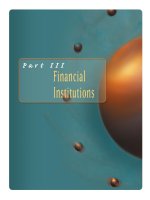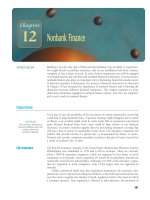TEST BANK The Economics of Money, Banking Financial Markets Alternate edition
Bạn đang xem bản rút gọn của tài liệu. Xem và tải ngay bản đầy đủ của tài liệu tại đây (6.12 MB, 650 trang )
Chapter!1
Why!Study!Money,!Banking,!and!Financial!Markets?
1.1 Why!Study!Financial!Markets?
1) Financial!markets!promote!economic!efficiency!by
A) channeling!funds!from!investors!to!savers.
B) creating!inflation.
C) channeling!funds!from!savers!to!investors.
D) reducing!investment.
Answer: C
Ques!Status:!Revised
2) Financial!markets!promote!greater!economic!efficiency!by!channeling!funds!from!________!to
________.
A) investors;!savers
B) borrowers;!savers
C) savers;!borrowers
D) savers;!lenders
Answer: C
Ques!Status:!New
3) Well-functioning!financial!markets!promote
A) inflation.
B) deflation.
C) unemployment.
D) growth.
Answer: D
Ques!Status:!Revised
4) Markets!in!which!funds!are!transferred!from!those!who!have!excess!funds!available!to!those
who!have!a!shortage!of!available!funds!are!called
A) commodity!markets.
B) fund-available!markets.
C) derivative!exchange!markets.
D) financial!markets.
Answer: D
Ques!Status:!Previous!Edition
2!!!!!!!Mishkin!·!Economics!of!Money,!Banking,!and!Financial!Markets,!Alternate!Edition
5) ________!markets!transfer!funds!from!people!who!have!an!excess!of!available!funds!to!people
who!have!a!shortage.
A) Commodity
B) Fund-available
C) Financial
D) Derivative!exchange
Answer: C
Ques!Status:!New
6) Poorly!performing!financial!markets!can!be!the!cause!of
A) wealth.
B) poverty.
C) financial!stability.
D) financial!expansion.
Answer: B
Ques!Status:!Revised
7) The!bond!markets!are!important!because!they!are
A) easily!the!most!widely!followed!financial!markets!in!the!United!States.
B) the!markets!where!foreign!exchange!rates!are!determined.
C) the!markets!where!interest!rates!are!determined.
D) the!markets!where!all!borrowers!get!their!funds.
Answer: C
Ques!Status:!Revised
8) The!price!paid!for!the!rental!of!borrowed!funds!(usually!expressed!as!a!percentage!of!the
rental!of!$100!per!year)!is!commonly!referred!to!as!the
A) inflation!rate.
B) exchange!rate.
C) interest!rate.
D) aggregate!price!level.
Answer: C
Ques!Status:!Previous!Edition
Chapter!1 !!!Why!Study!Money,!Banking,!and!Financial!Markets?!!!!!!! 3
9) Compared!to!interest!rates!on!long-term!U.S.!government!bonds,!interest!rates!on
three-month!Treasury!bills!fluctuate!________!and!are!________!on!average.
A) more;!lower
B) less;!lower
C) more;!higher
D) less;!higher
Answer: A
Ques!Status:!Previous!Edition
10) The!interest!rate!on!Baa!(medium!quality)!corporate!bonds!is!________,!on!average,!than!other
interest!rates,!and!the!spread!between!it!and!other!rates!became!________!in!the!1970s.
A) lower;!smaller
B) lower;!larger
C) higher;!smaller
D) higher;!larger
Answer: D
Ques!Status:!Previous!Edition
11) Everything!else!held!constant,!a!decline!in!interest!rates!will!cause!spending!on!housing!to
A) fall.
B) remain!unchanged.
C) either!rise,!fall,!or!remain!the!same.
D) rise.
Answer: D
Ques!Status:!Revised
12) An!increase!in!interest!rates!might!________!saving!because!more!can!be!earned!in!interest
income.
A) encourage
B) discourage
C) disallow
D) invalidate
Answer: A
Ques!Status:!New
4!!!!!!!Mishkin!·!Economics!of!Money,!Banking,!and!Financial!Markets,!Alternate!Edition
13) Everything!else!held!constant,!an!increase!in!interest!rates!on!student!loans
A) increases!the!cost!of!a!college!education.
B) reduces!the!cost!of!a!college!education.
C) has!no!effect!on!educational!costs.
D) increases!costs!for!students!with!no!loans.
Answer: A
Ques!Status:!Revised
14) High!interest!rates!might!cause!a!corporation!to!________!building!a!new!plant!that!would
provide!more!jobs.
A) complete
B) consider
C) postpone
D) contemplate
Answer: C
Ques!Status:!New
15) The!stock!market!is!important!because!it!is
A) where!interest!rates!are!determined.
B) the!most!widely!followed!financial!market!in!the!United!States.
C) where!foreign!exchange!rates!are!determined.
D) the!market!where!most!borrowers!get!their!funds.
Answer: B
Ques!Status:!Revised
16) Stock!prices!since!the!1950s!have!been
A) relatively!stable!trending!upward!at!a!steady!pace.
B) relatively!stable!trending!downward!at!a!moderate!rate.
C) extremely!volatile.
D) unstable!trending!downward!at!a!moderate!rate.
Answer: C
Ques!Status:!Previous!Edition
Chapter!1 !!!Why!Study!Money,!Banking,!and!Financial!Markets?!!!!!!! 5
17) A!rising!stock!market!index!due!to!higher!share!prices
A) increases!people"s!wealth,!but!is!unlikely!to!increase!their!willingness!to!spend.
B) increases!people"s!wealth!and!as!a!result!may!increase!their!willingness!to!spend.
C) decreases!the!amount!of!funds!that!business!firms!can!raise!by!selling!newly -issued
stock.
D) decreases!people"s!wealth,!but!is!unlikely!to!increase!their!willingness!to!spend.
Answer: B
Ques!Status:!Revised
18) When!stock!prices!fall
A) an!individual"s!wealth!is!not!affected!nor!is!their!willingness!to!spend.
B) a!business!firm!will!be!more!likely!to!sell!stock!to!finance!investment!spending.
C) an!individual"s!wealth!may!decrease!but!their!willingness!to!spend!is!not!affected.
D) an!individual"s!wealth!may!decrease!and!their!willingness!to!spend!may!decrease.
Answer: D
Ques!Status:!New
19) Changes!in!stock!prices
A) do!not!affect!people"s!wealth!and!their!willingness!to!spend
B) affect!firms"!decisions!to!sell!stock!to!finance!investment!spending.
C) occur!in!regular!patterns.
D) are!unimportant!to!decision!makers.
Answer: B
Ques!Status:!Revised
20) An!increase!in!stock!prices!________!the!size!of!people"s!wealth!and!may!________!their
willingness!to!spend,!everything!else!held!constant.
A) increases;!increase
B) increases;!decrease
C) decreases;!increase
D) decreases;!decrease
Answer: A
Ques!Status:!New
6!!!!!!!Mishkin!·!Economics!of!Money,!Banking,!and!Financial!Markets,!Alternate!Edition
21) Fear!of!a!major!recession!causes!stock!prices!to!fall,!everything!else!held!constant,!which!in
turn!causes!consumer!spending!to
A) increase.
B) remain!unchanged.
C) decrease.
D) cannot!be!determined.
Answer: C
Ques!Status:!Revised
22) A!common!stock!is!a!claim!on!a!corporation"s
A) debt.
B) liabilities.
C) expenses.
D) earnings!and!assets.
Answer: D
Ques!Status:!Revised
23) On!________,!October!19,!1987,!the!market!experienced!its!worst!one -day!drop!in!its!entire
history!with!the!DIJA!falling!by!more!than!500!points.
A) #Terrible!Tuesday#
B) #Woeful!Wednesday#
C) #Freaky!Friday#
D) #Black!Monday#
Answer: D
Ques!Status:!New
24) The!decline!in!stock!prices!from!2000!through!2002
A) increased!individuals"!willingness!to!spend.
B) had!no!effect!on!individual!spending.
C) reduced!individuals"!willingness!to!spend.
D) increased!individual!wealth.
Answer: C
Ques!Status:!Revised
Chapter!1 !!!Why!Study!Money,!Banking,!and!Financial!Markets?!!!!!!! 7
25) The!Dow!reached!a!peak!of!over!11,000!before!the!collapse!of!the!________!bubble!in!2000.
A) housing
B) manufacturing
C) high-tech
D) banking
Answer: C
Ques!Status:!New
26) The!price!of!one!country"s!currency!in!terms!of!another!country"s!currency!is!called!the
A) exchange!rate.
B) interest!rate.
C) Dow!Jones!industrial!average.
D) prime!rate.
Answer: A
Ques!Status:!Revised
27) The!market!where!one!currency!is!converted!into!another!currency!is!called!the!________
market.
A) stock
B) bond
C) derivatives
D) foreign!exchange
Answer: D
Ques!Status:!New
28) Everything!else!constant,!a!stronger!dollar!will!mean!that
A) vacationing!in!England!becomes!more!expensive.
B) vacationing!in!England!becomes!less!expensive.
C) French!cheese!becomes!more!expensive.
D) Japanese!cars!become!more!expensive.
Answer: B
Ques!Status:!Previous!Edition
8!!!!!!!Mishkin!·!Economics!of!Money,!Banking,!and!Financial!Markets,!Alternate!Edition
29) Which!of!the!following!is!most!likely!to!result!from!a!stronger!dollar?
A) U.S.!goods!exported!aboard!will!cost!less!in!foreign!countries,!and!so!foreigners!will!buy
more!of!them.
B) U.S.!goods!exported!aboard!will!cost!more!in!foreign!countries!and!so!foreigners!will!buy
more!of!them.
C) U.S.!goods!exported!abroad!will!cost!more!in!foreign!countries,!and!so!foreigners!will
buy!fewer!of!them.
D) Americans!will!purchase!fewer!foreign!goods.
Answer: C
Ques!Status:!Previous!Edition
30) Everything!else!held!constant,!a!weaker!dollar!will!likely!hurt
A) textile!exporters!in!South!Carolina.
B) wheat!farmers!in!Montana!that!sell!domestically.
C) automobile!manufacturers!in!Michigan!that!use!domestically!produced!inputs.
D) furniture!importers!in!California.
Answer: D
Ques!Status:!Revised
31) Everything!else!held!constant,!a!stronger!dollar!benefits!________!and!hurts!________.
A) American!businesses;!American!consumers
B) American!businesses;!foreign!businesses
C) American!consumers;!American!businesses
D) foreign!businesses;!American!consumers
Answer: C
Ques!Status:!Study!Guide
32) From!1980!to!early!1985!the!dollar!________!in!value,!thereby!benefiting!American!________.
A) appreciated;!consumers
B) appreciated,!businesses
C) depreciated;!consumers
D) depreciated,!businesses
Answer: A
Ques!Status:!Previous!Edition
Chapter!1 !!!Why!Study!Money,!Banking,!and!Financial!Markets?!!!!!!! 9
33) From!1980!to!1985!the!dollar!appreciated!relative!to!the!British!pound.!Holding!everything!else
constant,!one!would!expect!that,!when!compared!to!1980,
A) fewer!Britons!traveled!to!the!United!States!in!1985.
B) Britons!imported!more!wine!from!California!in!1985.
C) Americans!exported!more!wheat!to!England!in!1985.
D) more!Britons!traveled!to!the!United!States!in!1985.
Answer: A
Ques!Status:!Previous!Edition
34) When!in!1985!a!British!pound!cost!approximately!$1.30,!a!Shetland!sweater!that!cost!100
British!pounds!would!have!cost!$130.!With!a!weaker!dollar,!the!same!Shetland!sweater!would
have!cost
A) less!than!$130.
B) more!than!$130.
C) $130,!since!the!exchange!rate!does!not!affect!the!prices!that!American!consumers!pay!for
foreign!goods.
D) $130,!since!the!demand!for!Shetland!sweaters!will!decrease!to!prevent!an!increase!in
price!due!to!the!stronger!dollar.
Answer: B
Ques!Status:!Previous!Edition
35) Everything!else!held!constant,!a!decrease!in!the!value!of!the!dollar!relative!to!all!foreign
currencies!means!that!the!price!of!foreign!goods!purchased!by!Americans
A) increases
B) decreases.
C) remains!unchanged.
D) either!increases,!decreases,!or!remains!unchanged.
Answer: A
Ques!Status:!Revised
36) American!farmers!who!sell!beef!to!Europe!benefit!most!from
A) a!decrease!in!the!dollar!price!of!euros.
B) an!increase!in!the!dollar!price!of!euros.
C) a!constant!dollar!price!for!euros.
D) a!European!ban!on!imports!of!American!beef.
Answer: B
Ques!Status:!Revised
10!!!!!!!Mishkin!·!Economics!of!Money,!Banking,!and!Financial!Markets,!Alternate!Edition
37) If!the!price!of!a!euro!(the!European!currency)!increases!from!$1.00!to!$1.10,!then,!everything
else!held!constant,
A) a!European!vacation!becomes!less!expensive.
B) a!European!vacation!becomes!more!expensive.
C) the!cost!of!a!European!vacation!is!not!affected.
D) foreign!travel!becomes!impossible.
Answer: B
Ques!Status:!Revised
38) Everything!else!held!constant,!Americans!who!love!French!wine!benefit!most!from
A) a!decrease!in!the!dollar!price!of!euros.
B) an!increase!in!the!dollar!price!of!euros.
C) a!constant!dollar!price!for!euros.
D) a!ban!on!imports!from!Europe.
Answer: A
Ques!Status:!Revised
39) What!is!a!stock?!How!do!stocks!affect!the!economy?
Answer: A!stock!represents!a!share!of!ownership!of!a!corporation,!or!a!claim!on!a!firm"s
earnings/assets.!Stocks!are!part!of!wealth,!and!changes!in!their!value!affect!people"s
willingness!to!spend.!Changes!in!stock!prices!affect!a!firm"s!ability!to!raise!funds,!and
thus!their!investment.
Ques!Status:!Previous!Edition
1.2 Why!Study!Banking!and!Financial!Institutions?
1) Channeling!funds!from!individuals!with!surplus!funds!to!those!desiring!funds!when!the!saver
does!not!purchase!the!borrower"s!security!is!known!as
A) barter.
B) redistribution.
C) financial!intermediation.
D) taxation.
Answer: C
Ques!Status:!Revised
Chapter!1 !!!Why!Study!Money,!Banking,!and!Financial!Markets?!!!!!!! 11
2) Banks!are!important!to!the!study!of!money!and!the!economy!because!they
A) channel!funds!from!investors!to!savers.
B) have!been!a!source!of!rapid!financial!innovation.
C) are!the!only!important!financial!institution!in!the!U.S.!economy.
D) create!inflation.
Answer: B
Ques!Status:!Revised
3) Economists!group!commercial!banks,!savings!and!loan!associations,!credit!unions,!mutual
funds,!mutual!savings!banks,!insurance!companies,!pension!funds,!and!finance!companies
together!under!the!heading!financial!intermediaries.!Financial!intermediaries
A) provide!a!channel!for!linking!those!who!want!to!save!with!those!who!want!to!invest.
B) produce!nothing!of!value!and!are!therefore!a!drain!on!society"s!resources.
C) can!hurt!the!performance!of!the!economy.
D) hold!very!little!of!the!average!American"s!wealth.
Answer: A
Ques!Status:!Revised
4) Banks,!savings!and!loan!associations,!mutual!savings!banks,!and!credit!unions
A) are!no!longer!important!players!in!financial!intermediation.
B) since!deregulation!now!provide!services!only!to!small!depositors.
C) have!been!adept!at!innovating!in!response!to!changes!in!the!regulatory!environment.
D) produce!nothing!of!value!and!are!therefore!a!drain!on!society"s!resources.
Answer: C
Ques!Status:!Revised
5) Banks!and!other!financial!institutions!engage!in!financial!intermediation,!which
A) can!hurt!the!performance!of!the!economy.
B) can!benefit!economic!performance.
C) has!no!effect!on!economic!performance.
D) involves!borrowing!from!investors!and!lending!to!savers.
Answer: B
Ques!Status:!Revised
12!!!!!!!Mishkin!·!Economics!of!Money,!Banking,!and!Financial!Markets,!Alternate!Edition
6) Financial!institutions!that!accept!deposits!and!make!loans!are!called!________.
A) exchanges
B) banks
C) over-the-counter!markets
D) finance!companies
Answer: B
Ques!Status:!New
7) The!financial!intermediaries!that!the!average!person!interacts!with!most!frequently!are
________.
A) exchanges
B) over-the-counter!markets
C) finance!companies
D) banks
Answer: D
Ques!Status:!New
8) Which!of!the!following!is!not!a!financial!institution?
A) a!life!insurance!company
B) a!pension!fund
C) a!credit!union
D) a!business!college
Answer: D
Ques!Status:!New
9) The!delivery!of!financial!services!electronically!is!called!________.
A) e-business
B) e-commerce
C) e-finance
D) e-possible
Answer: C
Ques!Status:!New
Chapter!1 !!!Why!Study!Money,!Banking,!and!Financial!Markets?!!!!!!! 13
1.3 Why!Study!Money!and!Monetary!Policy?
1) Money!is!defined!as
A) bills!of!exchange.
B) anything!that!is!generally!accepted!in!payment!for!goods!and!services!or!in!the
repayment!of!debt.
C) a!risk-free!repository!of!spending!power.
D) the!unrecognized!liability!of!governments.
Answer: B
Ques!Status:!Previous!Edition
2) Evidence!from!the!United!States!and!other!foreign!countries!indicates!that
A) there!is!a!strong!positive!association!between!inflation!and!growth!rate!of!money!over
long!periods!of!time.
B) there!is!little!support!for!the!assertion!that!#inflation!is!always!and!everywhere!a
monetary!phenomenon.#
C) countries!with!low!monetary!growth!rates!tend!to!experience!higher!rates!of!inflation,!all
else!being!constant.
D) money!growth!is!clearly!unrelated!to!inflation.
Answer: A
Ques!Status:!Previous!Edition
3) The!upward!and!downward!movement!of!aggregate!output!produced!in!the!economy!is
referred!to!as!the!________.
A) roller!coaster
B) see!saw
C) business!cycle
D) shock!wave
Answer: C
Ques!Status:!New
4) Sustained!downward!movements!in!the!business!cycle!are!referred!to!as
A) inflation.
B) recessions.
C) economic!recoveries.
D) expansions.
Answer: B
Ques!Status:!Previous!Edition
14!!!!!!!Mishkin!·!Economics!of!Money,!Banking,!and!Financial!Markets,!Alternate!Edition
5) Prior!to!all!recessions!since!1900,!there!has!been!a!drop!in
A) inflation.
B) the!money!stock.
C) the!growth!rate!of!the!money!stock.
D) interest!rates.
Answer: C
Ques!Status:!Revised
6) Evidence!from!business!cycle!fluctuations!in!the!United!States!indicates!that
A) a!negative!relationship!between!money!growth!and!general!economic!activity!exists.
B) recessions!have!been!preceded!by!declines!in!share!prices!on!the!stock!exchange.
C) recessions!have!been!preceded!by!dollar!depreciation.
D) recessions!have!been!preceded!by!a!decline!in!the!growth!rate!of!money.
Answer: D
Ques!Status:!Previous!Edition
7) A!sharp!increase!in!the!growth!of!the!money!supply!is!likely!followed!by
A) a!recession.
B) a!depression.
C) an!increase!in!the!inflation!rate.
D) no!change!in!the!economy.
Answer: C
Ques!Status:!Revised
8) It!is!true!that!inflation!is!a
A) continuous!increase!in!the!money!supply.
B) continuous!fall!in!prices.
C) decline!in!interest!rates.
D) continually!rising!price!level.
Answer: D
Ques!Status:!Revised
Chapter!1 !!!Why!Study!Money,!Banking,!and!Financial!Markets?!!!!!!! 15
9) ________!theory!relates!changes!in!the!quantity!of!money!to!changes!in!aggregate!economic
activity!and!the!price!level.
A) Monetary
B) Fiscal
C) Financial
D) Systemic
Answer: A
Ques!Status:!New
10) The!management!of!money!and!interest!rates!is!called!________!policy!and!is!conducted!by!a
nation"s!________!bank.
A) monetary;!superior
B) fiscal;!superior
C) fiscal;!central
D) monetary;!central
Answer: D
Ques!Status:!New
11) The!organization!responsible!for!the!conduct!of!monetary!policy!in!the!United!States!is!the
A) Comptroller!of!the!Currency.
B) U.S.!Treasury.
C) Federal!Reserve!System.
D) Bureau!of!Monetary!Affairs.
Answer: C
Ques!Status:!Previous!Edition
12) Which!of!the!following!is!a!true!statement?
A) Money!or!the!money!supply!is!defined!as!Federal!Reserve!notes.
B) The!average!price!of!goods!and!services!in!an!economy!is!called!the!aggregate!price!level.
C) The!inflation!rate!is!measured!as!the!rate!of!change!in!the!federal!government!budget
deficit.
D) The!aggregate!price!level!is!measured!as!the!rate!of!change!in!the!inflation!rate.
Answer: B
Ques!Status:!Revised
16!!!!!!!Mishkin!·!Economics!of!Money,!Banking,!and!Financial!Markets,!Alternate!Edition
13) If!ten!years!ago!the!prices!of!the!items!bought!last!month!by!the!average!consumer!would!have
been!much!higher,!then!one!can!likely!conclude!that
A) the!aggregate!price!level!has!declined!during!this!ten-year!period.
B) the!average!inflation!rate!for!this!ten-year!period!has!been!positive.
C) the!average!rate!of!money!growth!for!this!ten-year!period!has!been!positive.
D) the!aggregate!price!level!has!risen!during!this!ten-year!period.
Answer: A
Ques!Status:!Revised
14) From!1950-2005!the!price!level!in!the!United!States!increased!more!than!________.
A) twofold
B) threefold
C) sixfold
D) ninefold
Answer: C
Ques!Status:!New
15) One!likely!explanation!for!the!relatively!high!rates!of!inflation!experienced!in!many!Latin
American!countries!is!the
A) relatively!slow!growth!in!the!money!supply!in!these!countries.
B) relatively!rapid!growth!in!the!money!supply!in!these!countries.
C) decline!in!the!prices!of!basic!commodities!in!these!countries.
D) budget!surpluses!maintained!in!these!countries.
Answer: B
Ques!Status:!Revised
16) Complete!Milton!Friedman"s!famous!statement,!#Inflation!is!always!and!everywhere!a
________!phenomenon.#
A) recessionary
B) discretionary
C) repressionary
D) monetary
Answer: D
Ques!Status:!Previous!Edition
Chapter!1 !!!Why!Study!Money,!Banking,!and!Financial!Markets?!!!!!!! 17
17) Countries!that!experience!very!high!rates!of!inflation!have
A) balanced!budgets.
B) rapidly!growing!money!supplies.
C) falling!money!supplies.
D) constant!money!supplies.
Answer: B
Ques!Status:!Revised
18) ________!policy!involves!decisions!about!government!spending!and!taxation.
A) Monetary
B) Fiscal
C) Financial
D) Systemic
Answer: B
Ques!Status:!New
19) When!tax!revenues!are!greater!than!government!expenditures,!the!government!has!a!budget
________.
A) crisis
B) deficit
C) surplus
D) revision
Answer: C
Ques!Status:!New
20) Budgets!deficits!can!be!a!concern!because!they!might
A) ultimately!lead!to!higher!inflation.
B) lead!to!lower!interest!rates.
C) lead!to!a!slower!rate!of!money!growth.
D) lead!to!higher!bond!prices.
Answer: A
Ques!Status:!Revised
18!!!!!!!Mishkin!·!Economics!of!Money,!Banking,!and!Financial!Markets,!Alternate!Edition
21) Budget!deficits!are!important!because!deficits
A) cause!bank!failures.
B) always!cause!interest!rates!to!fall.
C) can!result!in!higher!rates!of!monetary!growth.
D) always!cause!prices!to!fall.
Answer: C
Ques!Status:!Revised
22) Between!1950!and!1980!in!the!U.S.,!interest!rates!trended!upward.!During!this!same!time
period,
A) the!rate!of!money!growth!declined.
B) the!rate!of!money!growth!increased.
C) the!government!budget!deficit!(expressed!as!a!percentage!of!GNP)!trended!downward.
D) the!aggregate!price!level!declined!quite!dramatically.
Answer: B
Ques!Status:!Previous!Edition
23) What!happens!to!economic!growth!and!unemployment!during!a!business!cycle!recession?
What!is!the!relationship!between!the!money!growth!rate!and!a!business!cycle!recession?
Answer: During!a!recession,!output!declines!and!unemployment!increases.!!Prior!to!every
recession!in!the!U.S.!the!money!growth!rate!has!declined,!however,!not!every!decline!is
followed!by!a!recession.
Ques!Status:!New
1.4 How!We!Will!Study!Money,!Banking,!and!Financial!Markets
1) There!are!no!questions!for!section!1.4!How!We!Will!Study!Money,!Banking,!and!Financial
Markets
Answer: No!Correct!Answer!Was!Provided.
1.5 Concluding!Remarks
1) There!are!no!questions!for!section!1.5!Concluding!Remarks
Answer: No!Correct!Answer!Was!Provided.
Chapter!1 !!!Why!Study!Money,!Banking,!and!Financial!Markets?!!!!!!! 19
1.6 Appendix:!Defining!Aggregate!Output,!Income,!the!Price!Level,!and!the!Inflation
Rate
1) The!most!comprehensive!measure!of!aggregate!output!is
A) gross!domestic!product.
B) net!national!product.
C) the!stock!value!of!the!industrial!500.
D) national!income.
Answer: A
Ques!Status:!Previous!Edition
2) Values!measured!using!current!prices!are!called!________!values.
A) nominal
B) real
C) inflated
D) aggregate
Answer: A
Ques!Status:!New
3) When!the!total!value!of!final!goods!and!services!is!calculated!using!current!prices,!the
resulting!measure!is!referred!to!as
A) real!GDP.
B) the!GDP!deflator.
C) nominal!GDP.
D) the!index!of!leading!indicators.
Answer: C
Ques!Status:!Previous!Edition
4) GDP!measured!with!constant!prices!is!referred!to!as
A) real!GDP.
B) nominal!GDP.
C) the!GDP!deflator.
D) industrial!production.
Answer: A
Ques!Status:!Previous!Edition
20!!!!!!!Mishkin!·!Economics!of!Money,!Banking,!and!Financial!Markets,!Alternate!Edition
5) If!the!aggregate!price!level!at!time!t!is!denoted!by!Pt,!the!inflation!rate!from!time!t! -!1!to!t!is
defined!as
A) $t!=!(Pt!-!Pt!-!1)/Pt!-!1.
B) $t!=!(Pt!+!1!-!Pt!-!1)!/P t!-!1.
C) $t!=!(Pt!+!1!-!Pt)!/P t.
D) $t!=!(Pt!-!Pt!-!1)!/P t.
Answer: A
Ques!Status:!Previous!Edition
6) The!gross!domestic!product!is!the
A) the!value!of!all!wealth!in!an!economy.
B) the!value!of!all!goods!and!services!sold!to!other!nations!in!a!year.
C) the!market!value!of!all!final!goods!and!services!produced!in!an!economy!in!a!year.
D) the!market!value!of!all!intermediate!goods!and!services!produced!in!an!economy!in!a
year.
Answer: C
Ques!Status:!Revised
7) If!an!economy!has!aggregate!output!of!$20!trillion,!then!aggregate!income!is
A) $10!trillion.
B) $20!trillion.
C) $30!trillion.
D) $40!trillion.
Answer: B
Ques!Status:!Revised
8) If!your!nominal!income!in!1996!was!$50,000,!and!prices!doubled!between!1996!and!2002,!to
have!the!same!real!income,!your!nominal!income!in!2002!must!be
A) $50,000.
B) $75,000.
C) $90,000.
D) $100,000.
Answer: D
Ques!Status:!Revised
Chapter!1 !!!Why!Study!Money,!Banking,!and!Financial!Markets?!!!!!!! 21
9) If!your!nominal!income!in!1990!is!$50,000,!and!prices!increase!by!50%!between!1990!and!2000,
then!to!have!the!same!real!income,!your!nominal!income!in!2000!must!be
A) $50,000.
B) $75,000.
C) $100,000.
D) $150,000.
Answer: B
Ques!Status:!Revised
10) If!nominal!GDP!in!2001!is!$9!trillion,!and!2001!real!GDP!in!1996!prices!is!$6!trillion,!the!GDP
deflator!price!index!is
A) 7.
B) 100.
C) 150.
D) 200.
Answer: C
Ques!Status:!Revised
11) If!the!price!level!increases!from!200!in!year!1!to!220!in!year!2,!the!rate!of!inflation!from!year!1!to
year!2!is
A) 20%.
B) 10%.
C) 11%.
D) 120%.
Answer: B
Ques!Status:!Revised
12) If!real!GDP!grows!from!$10!trillion!in!2002!to!$10.5!trillion!in!2003,!the!growth!rate!for!real
GDP!is
A) 5%.
B) 10%.
C) 50%.
D) 0.5%.
Answer: A
Ques!Status:!Revised
22!!!!!!!Mishkin!·!Economics!of!Money,!Banking,!and!Financial!Markets,!Alternate!Edition
13) If!real!GDP!in!2002!is!$10!trillion,!and!in!2003!real!GDP!is!$9.5!trillion,!then!real!GDP!growth
from!2002!to!2003!is
A) 0.5%.
B) 5%.
C) 0%.
D) -5%.
Answer: D
Ques!Status:!Revised
14) If!the!CPI!is!120!in!1996!and!180!in!2002,!then!between!1996!and!2002,!prices!have!increased!by
A) 180%.
B) 80%.
C) 60%.
D) 50%.
Answer: D
Ques!Status:!Revised
15) If!the!CPI!in!2004!is!200,!and!in!2005!the!CPI!is!180,!the!rate!of!inflation!from!2004!to!2005!is
A) 20%.
B) 10%.
C) 0%.
D) -10%.
Answer: D
Ques!Status:!Revised
16) The!measure!of!the!aggregate!price!level!that!is!most!frequently!reported!in!the!media!is!the
________.
A) GDP!deflator
B) producer!price!index
C) consumer!price!index
D) household!price!index
Answer: C
Ques!Status:!New
Chapter!1 !!!Why!Study!Money,!Banking,!and!Financial!Markets?!!!!!!! 23
17) When!prices!are!measured!in!terms!of!fixed!(base-year)!prices!they!are!called!________!prices.
A) nominal
B) real
C) inflated
D) aggregate
Answer: B
Ques!Status:!New
Chapter!2
An!Overview!of!the!Financial!System
2.1 Function!of!Financial!Markets
1) Every!financial!market!has!the!following!characteristic:
A) It!determines!the!level!of!interest!rates.
B) It!allows!common!stock!to!be!traded.
C) It!allows!loans!to!be!made.
D) It!channels!funds!from!lenders-savers!to!borrowers-spenders.
Answer: D
Ques!Status:!Previous!Edition
2) Financial!markets!have!the!basic!function!of
A) getting!people!with!funds!to!lend!together!with!people!who!want!to!borrow!funds.
B) assuring!that!the!swings!in!the!business!cycle!are!less!pronounced.
C) assuring!that!governments!need!never!resort!to!printing!money.
D) providing!a!risk-free!repository!of!spending!power.
Answer: A
Ques!Status:!Revised
3) Financial!markets!improve!economic!welfare!because
A) they!channel!funds!from!investors!to!savers.
B) they!allow!consumers!to!time!their!purchase!better.
C) they!weed!out!inefficient!firms.
D) eliminate!the!need!for!indirect!finance.
Answer: B
Ques!Status:!Revised
4) Well-functioning!financial!markets
A) cause!inflation.
B) eliminate!the!need!for!indirect!finance.
C) cause!financial!crises.
D) produce!an!efficient!allocation!of!capital.
Answer: D
Ques!Status:!Revised
Chapter!2 !!!An!Overview!of!the!Financial!System!!!!!!!25
5) A!breakdown!of!financial!markets!can!result!in
A) financial!stability.
B) rapid!economic!growth.
C) political!instability.
D) stable!prices.
Answer: C
Ques!Status:!Revised
6) Which!of!the!following!can!be!described!as!direct!finance?
A) You!take!out!a!mortgage!from!your!local!bank.
B) You!borrow!$2500!from!a!friend.
C) You!buy!shares!of!common!stock!in!the!secondary!market.
D) You!buy!shares!in!a!mutual!fund.
Answer: B
Ques!Status:!Revised
7) Assume!that!you!borrow!$2000!at!10%!annual!interest!to!finance!a!new!business!project.!For
this!loan!to!be!profitable,!the!minimum!amount!this!project!must!generate!in!annual!earnings
is
A) $400.
B) $201.
C) $200.
D) $199.
Answer: B
Ques!Status:!Revised
8) You!can!borrow!$5000!to!finance!a!new!business!venture.!This!new!venture!will!generate
annual!earnings!of!$251.!The!maximum!interest!rate!that!you!would!pay!on!the!borrowed
funds!and!still!increase!your!income!is
A) 25%.
B) 12.5%.
C) 10%.
D) 5%.
Answer: D
Ques!Status:!Revised









